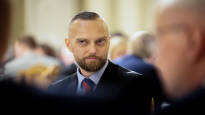Leader of the mercenary group Wagner Yevgeny Prigozhin threatened on Friday to topple Russia’s military leadership. However, the rebellion ended on Saturday night when he announced that his forces would stop advancing towards Moscow.
The twists and turns in Russia have been unpredictable and have provoked reflection on the consequences of the situation.
Docent of Military Sciences Ilmari Käihkö answers six key questions about events in Russia.
1. What was Wagner’s rebellion about?
– The background is definitely Wagner’s power struggle with the Russian military leadership. Yevgeni Prigozhin has been the Minister of Defense in a nock Sergei Shoigun and the Chief of the General Staff of the Armed Forces Valery Gerasimov with for a long time.
– All private actors, including Wagner, were to be placed under the Ministry of Defense on July 1st, which Prigozhin was not agreeing to. His aim was probably to defy the military leadership and thereby try to preserve Wagner’s independence.
– It is interesting that Prigozhin apparently did not start challenging himself Vladimir Putin. Putin, on the other hand, called him a traitor without mentioning his name. After Putin’s speech, among the Wagnerites, however, they began to demand a change of president. So it is possible that Prigozhin himself has started a rebellion, but the Wagnerites have started planning a coup. So they didn’t necessarily have the same goal.
– It seemed that the negotiated solution was simply Prigožin’s exit strategy from a situation that was completely impossible for him. In that sense, this underlines the weakness of Prigozhin and Wagner.
2. Is it possible that yesterday’s operation was a theater organized by Putin?
– There were two different interpretations of the situation yesterday. The first is that this was a piece of theater put on by Putin to push his own power. According to an alternative theory, Putin is an opportunist and a rather weak leader.
– I think the latter theory is at least as valid as the first. This does not in any way strengthen Putin’s image as a strong leader, but rather emphasizes the fragmentation of the Russian administration and society.
– the leader of Belarus Alexander Lukashenko the role as an external intermediary also underlines the weakness of the Russian regime: an outsider was needed to bring the divided Russians together.
3. What will happen to Wagner director Yevgeny Prigozhin now?
– All the details are not clear yet, but the question arises as to what Wagner and Prigozhin got. Prigozhin was allowed to save his life, at least for the time being, by going into exile in Belarus. Now, however, it doesn’t look like Wagner itself as an organization will get anything at all.
– It has been mentioned that some of the Wagner soldiers could agree with the Ministry of Defense on immunity from prosecution, but there are many open questions here. We don’t know if this deal will hold in the longer term.
– If Prigozin really goes into exile in Belarus, then maybe Lukashenko will be able to give him a little more security. On the other hand, Lukashenko is in Putin’s pocket, so if Putin decides at some point to get rid of Prigozhin, it is not impossible.
– One possibility is that in the future Prigozhin will focus on operations in Africa and Syria, where Wagner’s troops are also present. Time will tell what will happen, but it would not be surprising if Prigozhin were to be got rid of.
4. Is it possible that there will be new rebellions or even coup attempts in Russia?
– The question is, of course, which entity would be able to do this besides Wagner. Such a body should be found within the security authorities. At first it seemed very unlikely that Prigozhin could succeed. The reason for that was that he didn’t get much support from the security authorities or the political elite.
5. What is Putin’s position after this?
– Putin promised in his speech to act against “traitors”. However, if they are given amnesties and concessions, it will highlight the weakness of Putin’s regime.
– Usually, after internal challengers have appeared, some kind of cleansing takes place. It is now a question of who the possible purges will target. To Prigozhin and Wagner, to the top military command, or to possible political supporters of Prigozhin?
– Some kind of centralization of power may take place and thus Putin’s position of power may improve. He is now trying to save what can be saved by getting rid of his competitors.
– In the near future, we will also see if some people start to disappear from the public eye. I don’t mean that they should be physically eliminated – which of course is also possible – but whether, for example, the military leadership should be changed.
6. How does the situation affect the war in Ukraine?
– This does not necessarily have an effect.
– The most immediate scenario that would have had an impact would have been a civil war-type situation. It could have divided Russian forces and loyalties in Ukraine. It must be remembered that the Russians on the front line in Ukraine are mainly fighting for themselves and their comrades. Political patterns far in the background do not necessarily affect the situation in any way.
– Ukrainians, of course, think that the bigger the disputes inside Russia, the better it is for them. Now the consequences were probably not what the Ukrainians hoped for.
